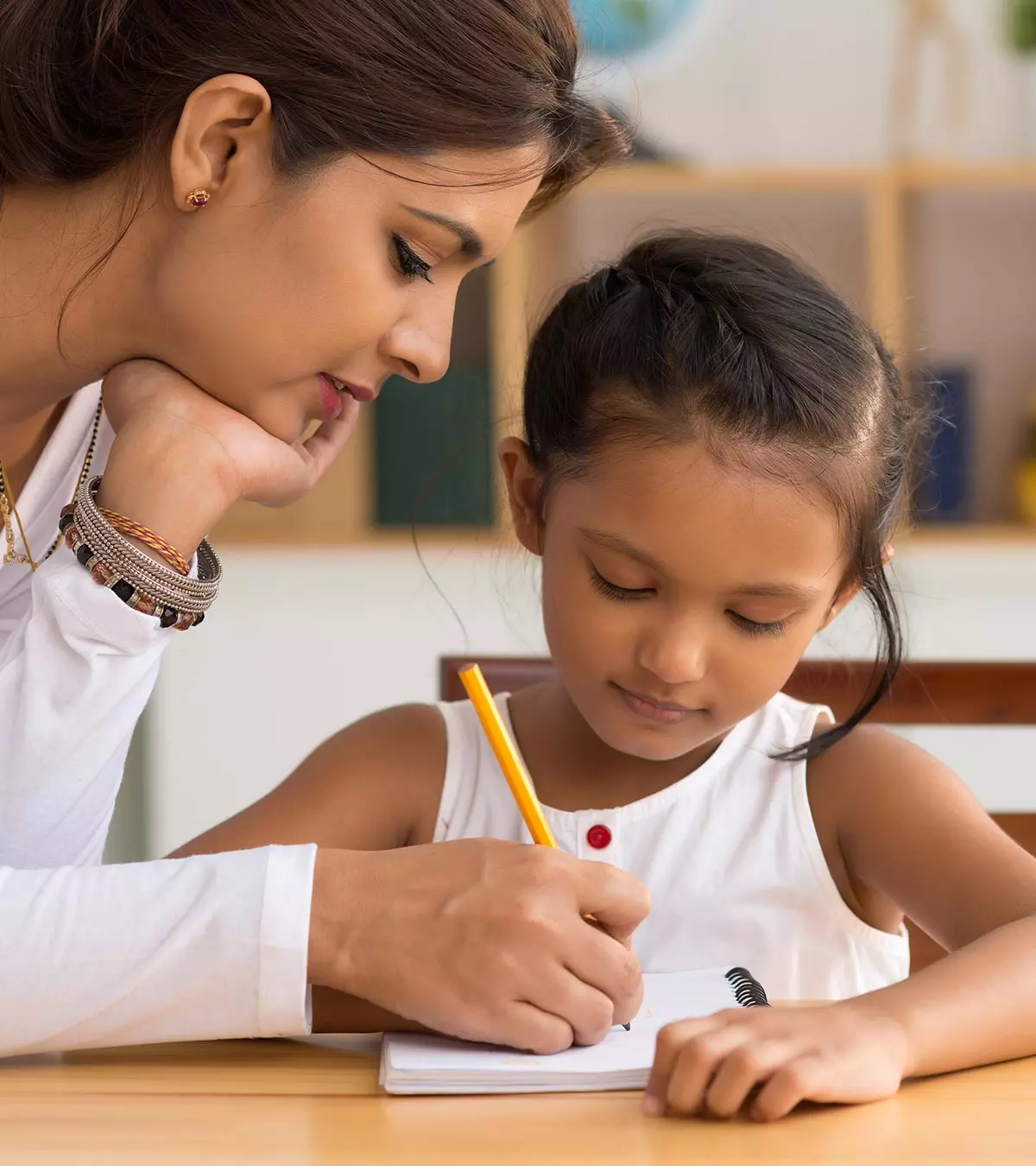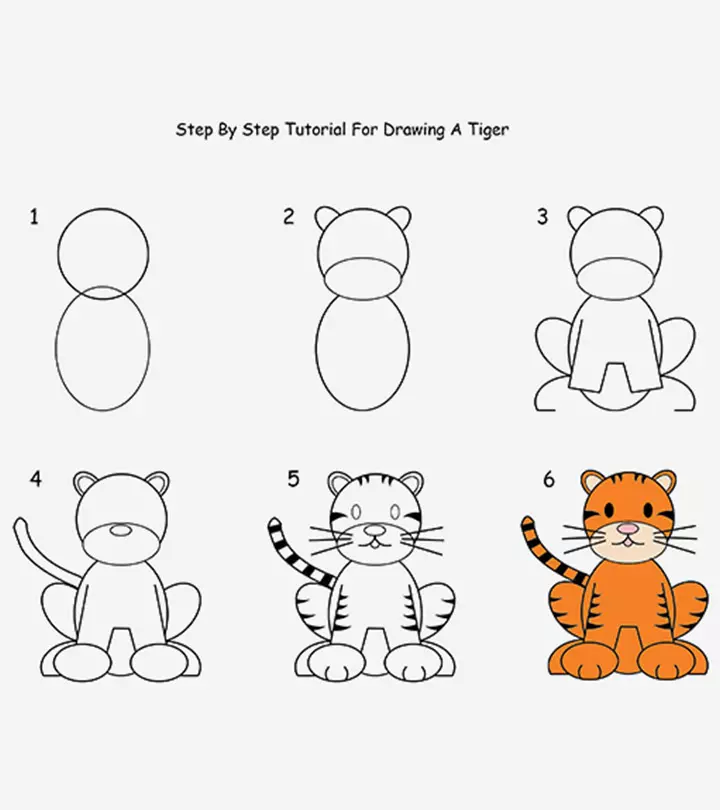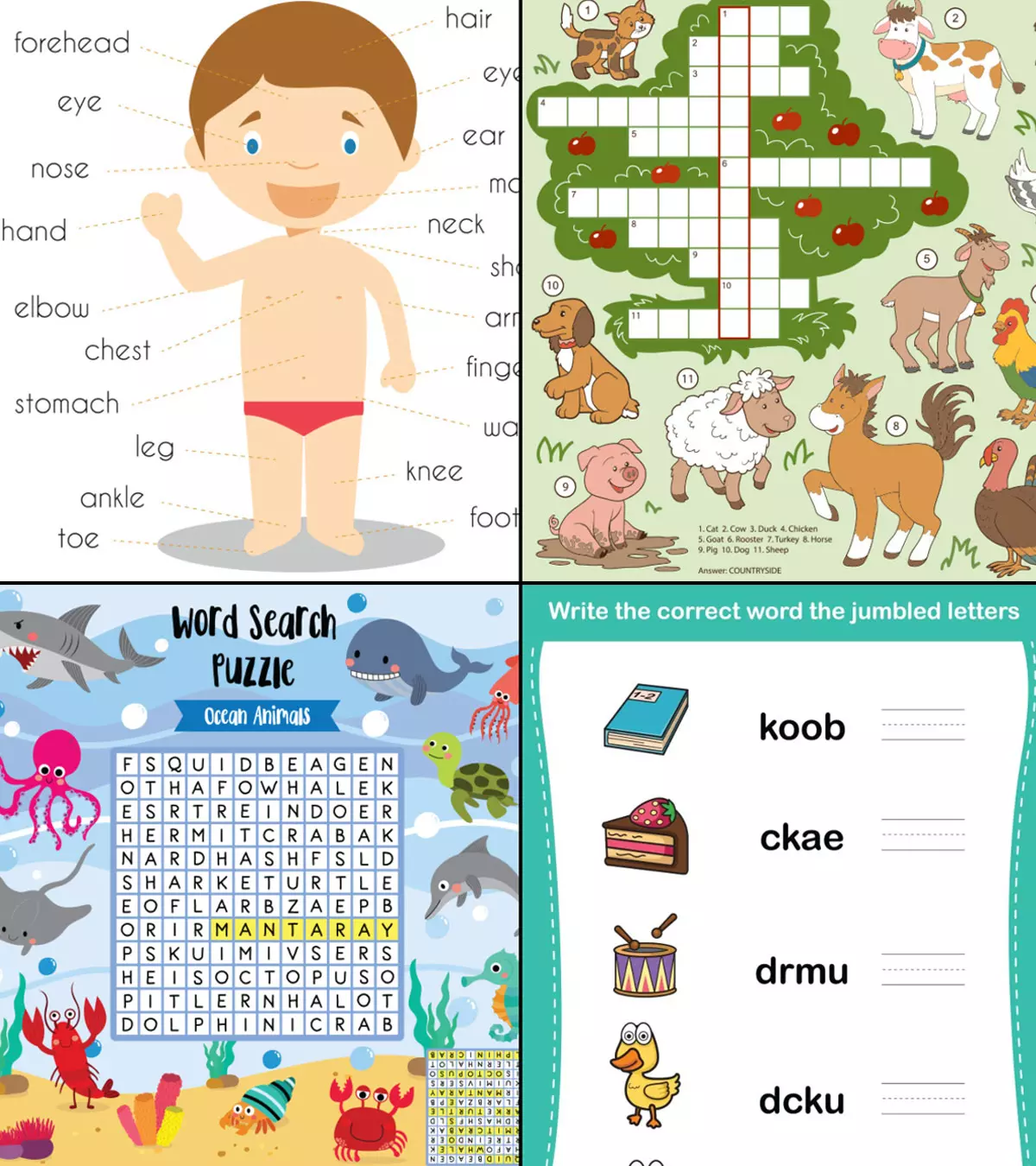
Image: MomJunction Design Team
Children learn more by observing parents than by listening to what they are taught. If you want good habits for kids, you must follow them, too. It would help if you practiced what you preach, or your children will have a hard time trying to emulate these habits. Demonstrating consistency in your behavior reinforces the lessons you teach, making it more likely that your children will adopt these practices as their own. Additionally, children are more receptive to habits that they see yielding positive outcomes for their parents. If your child is old enough to understand good habits, start young! Scroll below and keep reading to know how you can factor in good habits in your little one’s life.
Key Pointers
- Teach children the value of healthy eating and the negative effects of junk food.
- Encourage proper hygiene habits, such as washing hands before and after meals and brushing teeth twice daily.
- Instill values like empathy and thankfulness, sharing, and responsibility.
- Establish a foundation for moral principles in children by instilling the value of accountability and honesty through your actions.
24 Good Habits For School Children To Inculcate
Here is a list of good habits for students that you should introduce as your children start school.
1. Eat healthy foods
This one’s probably the toughest of them all. Just like most other children, your child too will be tempted to grab a bag of chips or a packet of biscuits but teaching healthy habits and self-control early in life can help them in the longer run.
- Explain the importance of healthy eating and how junk foods could be harmful for health. Children must avoid junk foods because they often contain high levels of sugar, fat, and salt, which can contribute to health issues such as obesity, diabetes, and heart disease (1).
- Make homemade versions of fast food snacks like noodles, pasta and pizza for your child occasionally.
2. Follow table manners
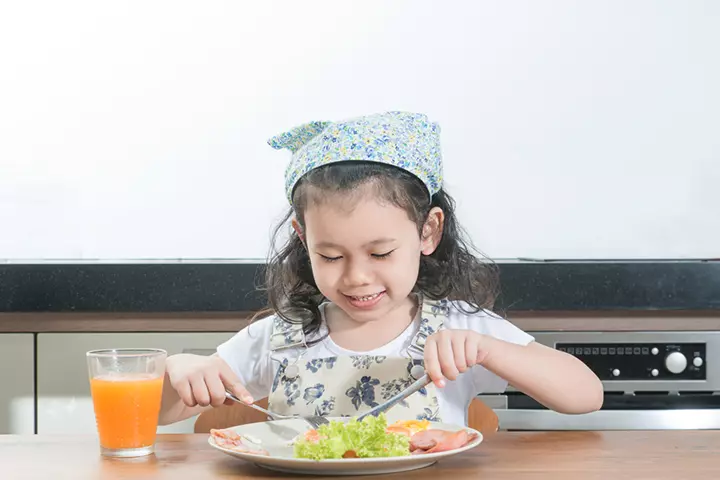
This is definitely one of the most important habits you need to educate your child about. It’s now time to start treating your child like an adult as he sits at the table for dinner.
Jay Davidson, a father and blogger, shares how he and his partner taught table manners to their children. He says, “When my kids were growing up, we had a family tradition that we called Bad Manners Night. Held during dinner every Wednesday, this was a night when everyone had good laughs about each others’ antics, such as picking up food with our fingers, resting our elbows on the table, and proudly making burping sounds without so much as an ‘excuse me.’
“This turned out to be a wildly successful and positive means for teaching our children good table manners, and it carried forward into their adult lives, in that they both have exemplary table manners (They are now 33 and 40 years old) (i).”
 Quick tip
Quick tip3. Wash hands before and after meals
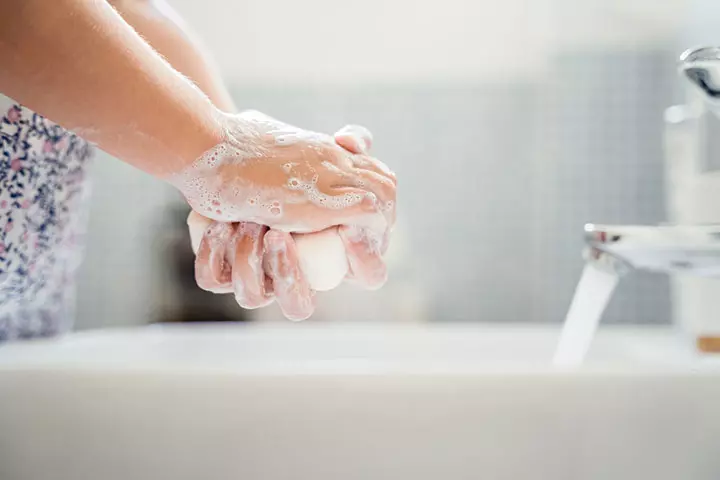
Hygiene comes above everything.
- Remind them to wash hands before and after a meal.
- Ensure they use a soap or cleanser to wash their hands.
4. Brush twice a day
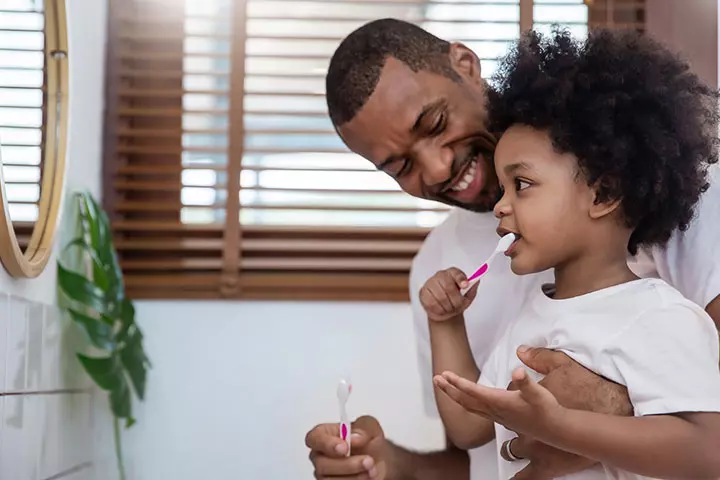
Younger children are often lazy when it comes to brushing their teeth.
- Make sure you take a few minutes to educate and discipline him about the importance of proper brushing.
- Try and make brushing a fun-filled activity by occasionally allowing him some sweet treats if he promises to brush right after he has them.
5. Limit the screen time

In today’s era, we rely on social media for information. Children often get addicted to it and stay online for hours. Limit their screen time and allow them to watch television, surf the internet, or play video games only for a fixed time. This is also a good way to teach time management to kids as they learn to prioritize their viewing time and matter.
6. Make reading a habit

Reading is a good habit for children. Make a routine for reading at a fixed time, maybe after they watch television or before bed. This will improve their communication skills and enrich their minds with vocabulary.
7. Sleep on time
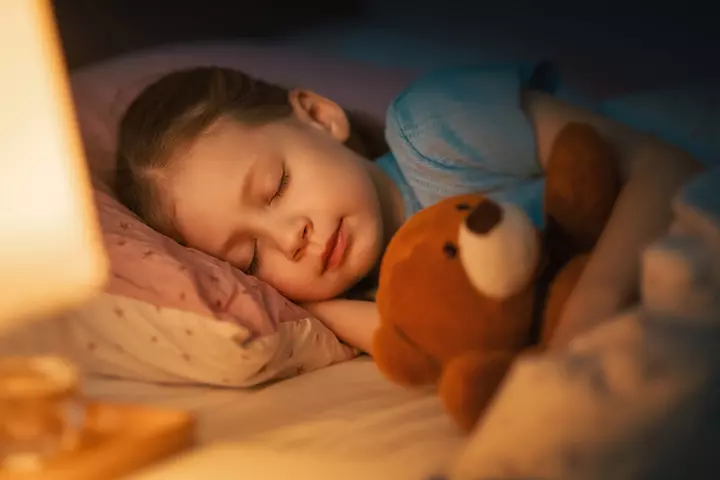
Get your child to establish a correct sleep schedule.
- It will be the most important when your child starts going to school.
- Stick to a regular bedtime yourself. Your child is less likely to be awake if you aren’t.
8. Play outdoors

It’s easy to get glued to the TV screen watching cartoons or playing screen games, but that’s not what you would want your child to be doing.
- Get out with him for some fresh outdoor activities every day as it imparts physical activity and improves their observation skills and creativity.
- Encourage physical activity.
9. Clean up the mess
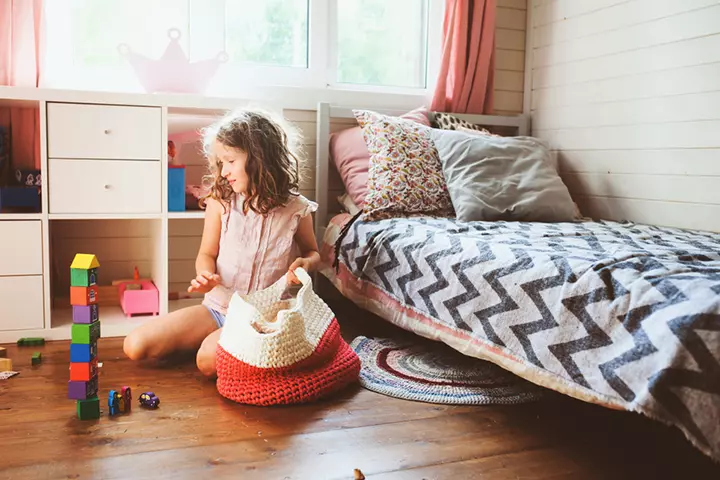
It’s always a good idea to get your child clean up the mess in his room.
- Allot him a span of 10-15 minutes a day to make sure all his toys, books and stuff are placed at their appropriate places.
- You can always reward him with his favorite home-cooked snack afterward!
10. Be responsible with money

If your child is old enough that you start to offer him pocket money, educate him about being responsible with money.
- Get him a piggy bank.
- Encourage him to save his money and manage his expenses within a given budget (you do it all the time- and it’s time to let your child know that too).
 Quick tip
Quick tip11. Say ‘Please’ and ‘Thank You’
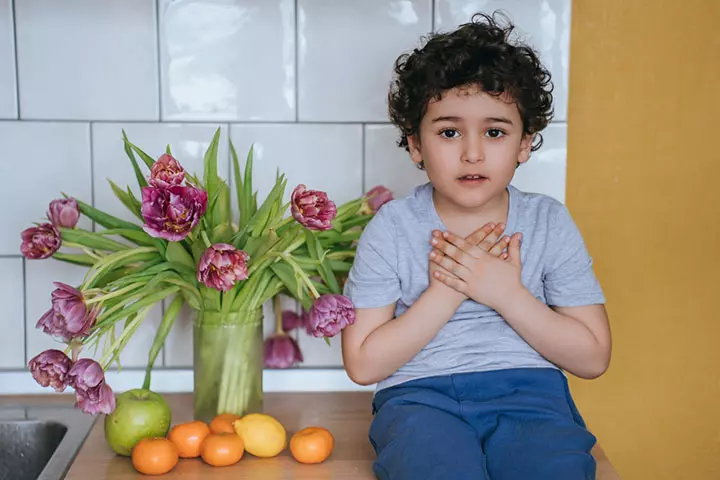
Another basic rule you need to educate your child about. ‘Please’ and ‘Thank You’ are magical words that can handle most jobs without any hassles, and that’s what you would want your child to know. Teach them the importance of empathy and gratitude.
12. Share with others
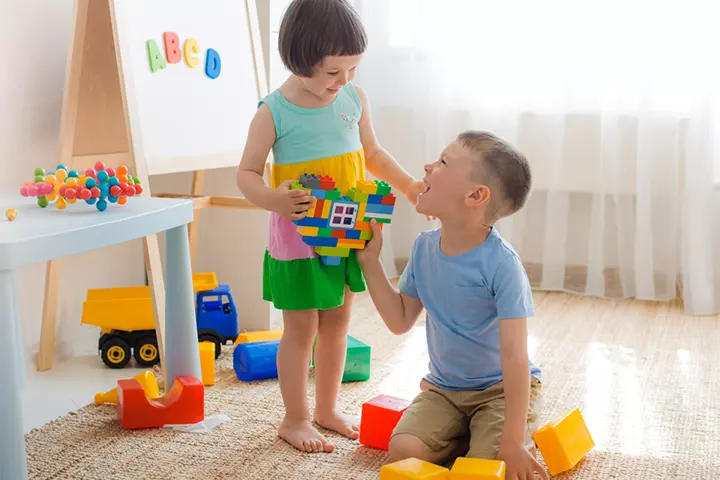
It is one of the very important good habits for school children.
- If your child is an only child, you will need to explain how sharing transforms as an important part of life.
- Educate him about how sharing doubles up the joy and how he is lucky enough to have a particular toy or object while others are not.
- Siblings usually have no problem with this one (in most cases). If there are issues, you know how best to teach your children the art of sharing and kindness.
13. Don’t litter public spaces

Increase environmental awareness in your children by explaining to them how littering in public places like a park or a garden symbolizes a bad citizen. Ask him to always throw away trash in a dustbin and play his part in being a civilized citizen.
14. Take up household chores
Assigning age-appropriate duties is one of the best ways to teach responsibility to kids. You may ask younger children to tidy up toys or set the table. For older ones, you can assign more advanced tasks like handling laundry. Outline expectations for each responsibility and offer support and guidance as necessary. This approach promotes a sense of competence in children and helps them build confidence.
15. Be honest
Your actions and words influence your children profoundly. So, lead by example and practice honesty. Encourage them to be truthful in all situations, establishing a foundation for moral values. Appreciate honesty and encourage their good behavior through positive reinforcements.
16. Exercise every day

Encourage regular physical activity to boost your children’s cardiovascular health, strengthen muscles, and enhance mood. Explaining the long-term benefits, such as reduced risk of chronic diseases like diabetes and heart disease, can motivate children to make exercise a daily habit. You can also participate in family activities like hiking, cycling, or team sports to demonstrate a positive attitude toward fitness.
17. Know the dangers of substance abuse
Once your child reaches the appropriate age, discuss the risks associated with substance use, including alcohol, tobacco, and drugs.
- You should explain how these substances can adversely affect physical health, mental well-being, and decision-making abilities.
- Open communication can help children understand the consequences of addiction and peer pressure, empowering them to make informed choices.
18. Enjoy family time
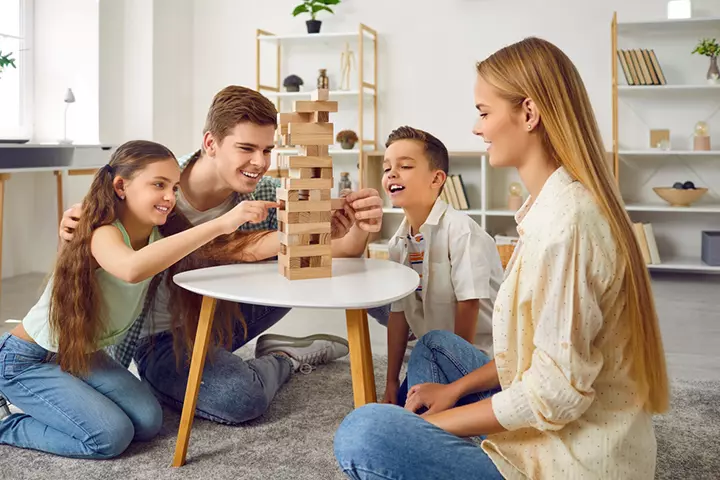
Family time strengthens bonds, provides emotional support, and fosters a sense of security and belonging. You should prioritize shared activities like meals, games, and outings, which can enhance communication and understanding among family members. This time together is crucial for developing strong familial relationships and building a positive home environment.
19. Clean ears
Maintaining clean ears is essential for preventing infections and ensuring good hearing.
- Teach your children the safe way to clean their ears, emphasizing gentle cleaning around the outer ear without inserting objects into the ear canal.
- Regular checks during routine healthcare visits can also help manage ear health effectively.
20. Shower every day
Encourage your children to adopt routines that include a daily bath or shower, explaining how personal cleanliness positively impacts social interactions and self-esteem. Daily showers are essential for maintaining personal hygiene, preventing body odor, and protecting skin from irritants and bacteria.
21. Keep hair clean
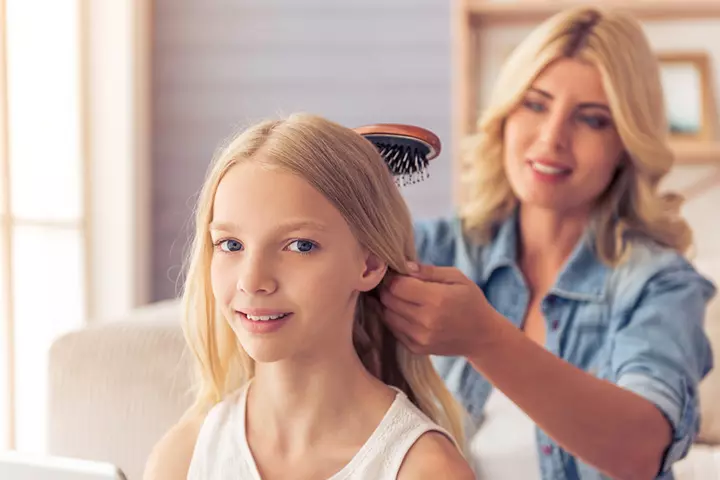
Ensure your child keeps their hair clean to prevent scalp infections and maintain overall hair health. You should teach them to shampoo and condition their hair properly and the importance of regular washing to avoid issues like dandruff and oily scalp.
22. Keep nails short
It is important to keep your child’s nails short and clean to prevent the accumulation of dirt and reduce the risk of bacterial infections. Talk to your child about proper nail hygiene, including regular trimming and cleaning. This habit not only promotes cleanliness but also aids in maintaining proper hand hygiene.
23. Spend time with friends
Spending time with friends is essential for developing social skills, building confidence, and relieving stress. Encourage your children to cultivate friendships and participate in social activities, which can teach valuable interpersonal skills and emotional resilience.
24. Don’t skip breakfast
Emphasize the importance of a healthy breakfast as it fuels the body, kick-starts metabolism, and enhances concentration and performance in school activities. Teaching your children to make time for breakfast can establish long-term healthy eating patterns.
Importance of Teaching Healthy Habits to Kids
help establish a robust foundation for physical, mental, and emotional health, which can support them throughout their lives. Some important points to consider include:
- Physical health: Regular exercise and a balanced diet can help prevent childhood obesity and reduce the risk of chronic diseases in adulthood.
- Mental sharpness: Adequate sleep, proper nutrition, and reduced screen time can enhance concentration and energy levels, improving alertness and academic performance.
- Good hygiene: Daily hygiene practices can contribute to overall health and prevent the spread of illness.
- Emotional resilience: Developing effective communication and stress management prepares children to handle life’s challenges with more resilience and confidence.
Frequently Asked Questions
1. Why are good habits important for students?
Good habits are important for students as they lead to improved academic performance, better health, and increased self-discipline. By developing habits such as organization, time management, focus, healthy eating, exercise, and adequate sleep, students can set themselves up for success in their academic and personal lives.
2. How can students develop good habits?
To develop good habits, students can start by setting specific and achievable goals, breaking habits into smaller steps, tracking progress, and being consistent and persistent. They can also seek support from others, such as family and friends, and reward themselves for making progress.
3. What is the difference between good habits and good manners?
Good habits and good manners are related but distinct concepts. Good habits are actions or behaviors that benefit one’s personal and professional development. They are actions that are repeated regularly and become part of one’s routine, such as exercising regularly, eating a healthy diet, and being punctual. On the other hand, good manners refer to socially acceptable behaviors and courtesies that show respect for others, such as saying “please” and “thank you,” using polite language, and avoiding rude or inappropriate behaviors.
4. How can I help my children keep away from bad habits?
You can help avoid bad habits in kids by actively modeling positive behaviors and reinforcing good choices with praise and rewards. Establishing clear, consistent rules and consequences related to negative behaviors is crucial. Engaging children in open discussions about the consequences of bad habits can also promote self-awareness and self-regulation. Additionally, providing a supportive and nurturing environment can encourage children to move towards healthier habits naturally.
It is rightly said that old habits die hard. This article lists some of the habits parents should teach their children to impact their lives positively and drive them to be responsible and considerate citizens. To make a lasting impact on your child, ensure you follow the habits you want in your children as they learn by observing their parents. Turn these activities into life lessons for kids by talking about how beneficial they are for good physical and mental health. However, teaching new habits is not enough. Ensure your children are aware of the benefits of following the habits and see that they stick with them.
Infographic: Good Habits For School Children
Good habits are essential to a child’s development and can lay the foundation for a healthy and successful life. As children progress through school, they need to develop a set of habits to help them succeed academically and socially. Explore the must-have good habits for school children to develop
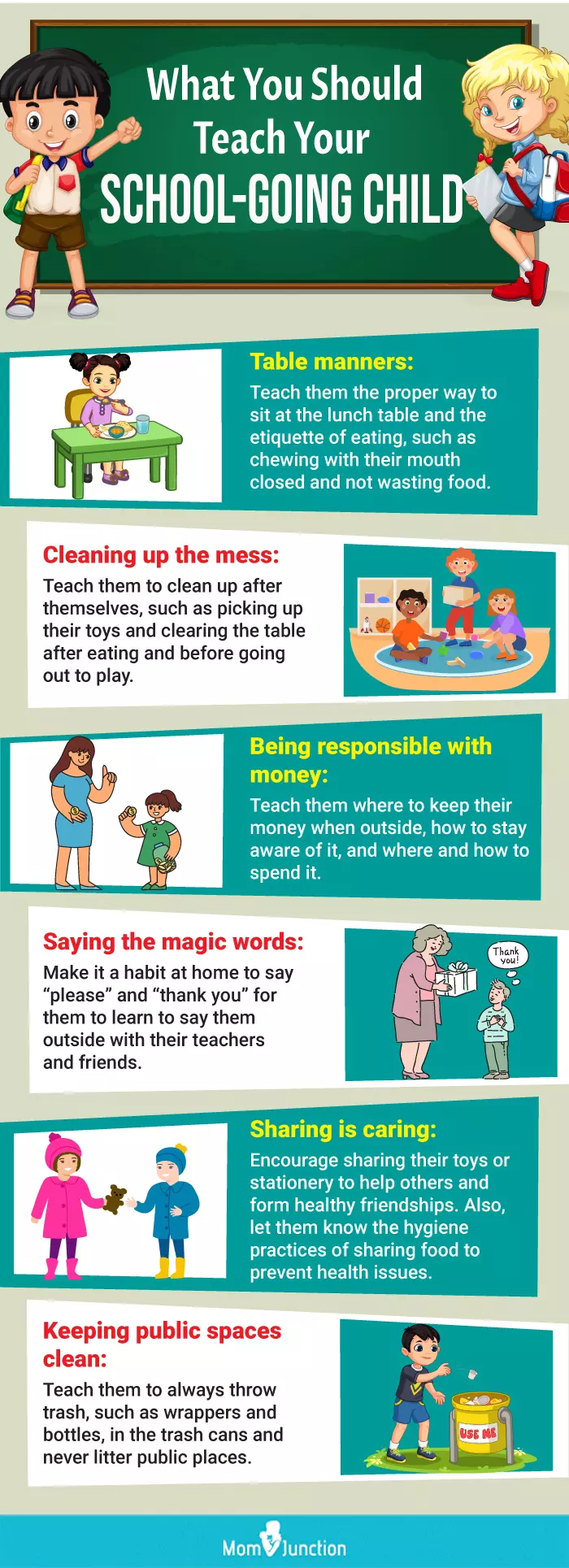
Illustration: Momjunction Design Team
Illustration: Good Habits For Kids That Parents Should Teach

Image: Stable Diffusion/MomJunction Design Team
Personal Experience: Source
MomJunction articles include first-hand experiences to provide you with better insights through real-life narratives. Here are the sources of personal accounts referenced in this article.
i. Bad manners night;https://jaydavidson-sfo.medium.com/bad-manners-night-bcdb3e517ae2
References
- Ankul Singh S et. al.; (2021); Junk food-induced obesity- a growing threat to youngsters during the pandemic.
https://www.ncbi.nlm.nih.gov/pmc/articles/PMC8459649/
Community Experiences
Join the conversation and become a part of our nurturing community! Share your stories, experiences, and insights to connect with fellow parents.
Read full bio of Katherine Paxton
Read full bio of Manjiri Kochrekar
Read full bio of Harshita Makvana
Read full bio of Apoorva K








